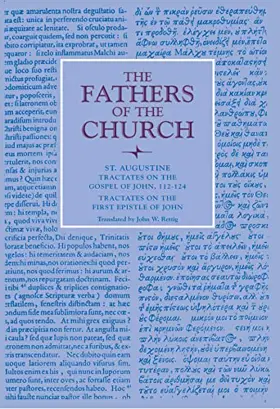

Tractates on John, Volume 5 (112–124); Tractates on 1 John
Pages
301
Publisher
Catholic University of America Press
Published
1995
ISBN-13
9780813226248
In this volume, which concludes John W. Rettig's translation of St. Augustine's Tractates on the Gospel of John, Augustine applies his keen insight and powers of rhetoric to the sacred text, drawing the audience into an intimate contemplation of Jesus through the course of his Passion, Death, and Resurrection.
Augustine clarifies the meaning of words and phrases (often appealing to the Greek text), resolves obscurities, and reconciles apparent contradictions. He explains the Scriptures on several levels of meaning and draws from them practical implications for the Christian life. Always evident in his teaching and exhortation is his strong desire to lead souls to a knowledge and love of God.
Because the scriptural readings for holy Week and the Octave of Easter were fixed to some extent, during the Easter Octave in A.D. 407 Augustine had to interrupt his exposition of John's Gospel after delivering the twelfth tractate. In order to maintain some continuity, he decided to preach upon the First Epistle of John. Its central theme, which Augustine saw to be caritas (Christian love), was especially appropriate at this time, for the Donatist schism had torn many away from the Church at Hippo. In the ten tractates on the First Epistle of John, Augustine develops an outline of his theology on love and explains its implications for the Mystical Body of Christ. He teaches that those who hate the members of Christ cannot truly love Christ—even if they profess otherwise, even if they were to lay down their lives for Him. In these tractates Augustine once again reveals himself as the humble and zealous pastor of souls. His words seem to radiate the very love about which he speaks, so that few of his listeners could accuse him of preaching what he himself did not practice.
Augustine clarifies the meaning of words and phrases (often appealing to the Greek text), resolves obscurities, and reconciles apparent contradictions. He explains the Scriptures on several levels of meaning and draws from them practical implications for the Christian life. Always evident in his teaching and exhortation is his strong desire to lead souls to a knowledge and love of God.
Because the scriptural readings for holy Week and the Octave of Easter were fixed to some extent, during the Easter Octave in A.D. 407 Augustine had to interrupt his exposition of John's Gospel after delivering the twelfth tractate. In order to maintain some continuity, he decided to preach upon the First Epistle of John. Its central theme, which Augustine saw to be caritas (Christian love), was especially appropriate at this time, for the Donatist schism had torn many away from the Church at Hippo. In the ten tractates on the First Epistle of John, Augustine develops an outline of his theology on love and explains its implications for the Mystical Body of Christ. He teaches that those who hate the members of Christ cannot truly love Christ—even if they profess otherwise, even if they were to lay down their lives for Him. In these tractates Augustine once again reveals himself as the humble and zealous pastor of souls. His words seem to radiate the very love about which he speaks, so that few of his listeners could accuse him of preaching what he himself did not practice.